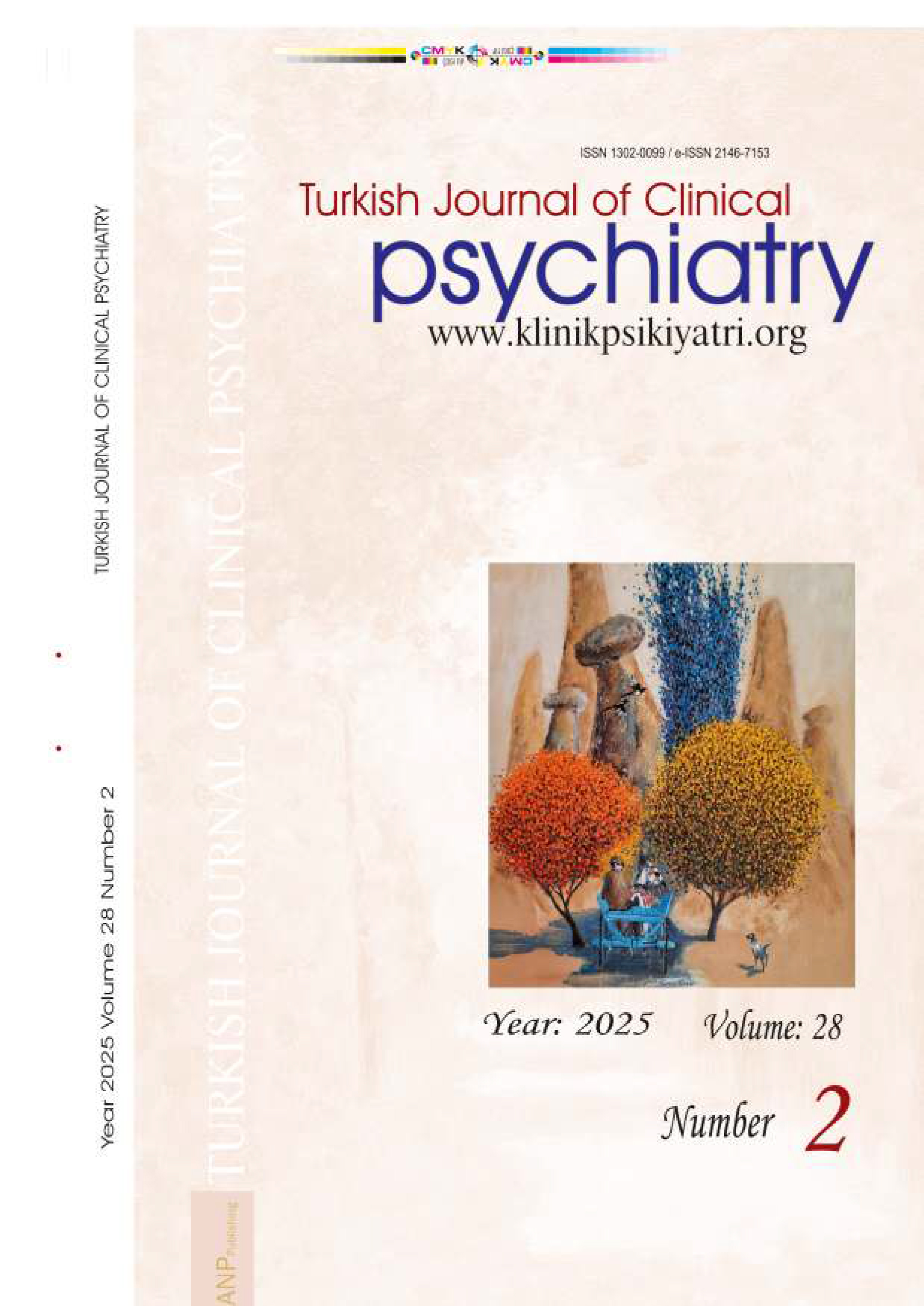





Volume: 2 Issue: 4 - 1999
| RESEARCH ARTICLE | |
| 1. | An Epidemiological Study on Cage Test and Alcohol Consumption Metin TURAN, Ali ÇİLLİ, RÜStem AŞKIN, Haşan HERKEN, Metin TELCİOĞLU, Rahim KUCUR Pages 217 - 221 Alcohol consumption and problems related to it showed an important rise in last25-30years. A noticaple rise is also seen on the alcohol consumption and its diffusity in our country. This study was planned on totally 2000 workers of the Konya- Seydişehir Aluminium Working Directory. CAGE test and a questionnaire asking sociodemographic characteristics were given to cases. Data from totally 1670 cases were taken into consideration. Data were appreciated with t test in SPSS, Ki square and correlation analysis. 26,1% of the cases (n: 436) were found to consume alcohol, CAGE points of the 34,63% of the alcohol consuming cases (n: 150) were found to be 2 and more than it (at the level of dependency) in the study. Alcohol consumption was found to be more in the families of cases consuming alcohol at every levels, education levels were found to be higher and they were found to be civil servant mostly. Positive relationship was found between alcohol consumption amount with frequency of consumption and CAGE points. The findings cannot be generalized to the all population of the country and alcohol consumption in our area is infrequent but alcohol dependency risk is thought to be at an important level and this is also thought to be related to education level and factors concerning family. |
| REVIEW | |
| 2. | Genetics of Alcoholism Ender ALTINTOPRAK, Hakan COŞKUNOL Pages 222 - 229 There are a series of factors which may all interact in predisposing or protecting an individual against alcohol abuse, alcoholism and alcohol-related disorders: the availability of alcohol, the price, an individual’s socio-cultural, psychological, physiological, and genetic make-up. Genes have long been suspected to play a role in the aetiology of alcoholism. Among the most common strategies employed thus far to identify hereditary factors in alcoholism are family studies, twin studies, adoption studies and high risk groups. |
| 3. | Relationship Between Psychiatry and Social Sciences Mehmet Akif ERSOY Pages 230 - 238 Psychiatry within its bio-psycho-social model, has close relationships with social sciences. Knowledge about his/her patient's cultural view of illness, availability of psychiatric help, group relations and conflicts with other groups, and even the vulnerabilities transmitted from history will help the psychiatrist to under-stand and help his patient better. History which explores past experiences of human beings, sociology which studies the processes of how the groups behave or change and anthropology which investigates the cultural aspects, may benefit from psychiatric view, data and methodology. That's why interdisciplinary studies are more and more being conducted. This review aims to summarize the mutual relationship between social sciences and psychiatry. |
| CASE REPORT | |
| 4. | Increasement of Therapeutic Effectivity in Short Term Therapies Mine Özmen Pages 239 - 246 During the recent years, short term psychotherapies has come into attention due to social and economic conditions. More often than not, the psychiatrist and the patient see each other for only one session and the patient may benefit from this single session beyond the expectations. The characteristics of these patients and using this interaction process most effectively is the focus of attention of many clini-dans. The psychiatrist, has to use his limited time most efficiently especially in inpatient hospitals, has to expand his arnementarum and has to be equipped with different approaches which might help him to comprehend his patient in a better way. Even a single session can be used most effectively on behalf of the patient. The approaches which can be used to increase therapeutic effectivity in brief encounters has been tried to be summarized with special emphasis on dynamic approach and 4 cases who benefited from one or a few sessions are presented. |
| REVIEW | |
| 5. | Psychological Theory of Social Phobia Hakan Türkçapar Pages 247 - 253 In this article psychological theories addressing the etiology of social anxiety disorder are presented. Human beings are by nature social animals, but for some, social scrunity is a source of extreme anguish. Although no one has discovered a single cause of social anxiety disorder, studies suggest that both biological and psychological factors may play a role. The core psychological feature of social phobia is marked and persistent fear of embarrassment or humiliation in social situations where the individual worries that others may judge his or her performance as too much or too little. |
| RESEARCH ARTICLE | |
| 6. | The Psychological and Social Influences of Breast Cancer Şahnur Şener, Nazan GÜNEL, Zafer AKÇALI, Selahattin Şenol, Aylin KOÇKAR Pages 254 - 260 The effect of psychological, social, and environmental influences on the onset and later stages of illnesses are thought to be very important. For many years, these factors were believed to have a role in the etiology of cancer, yet recently, it has been proposed that these factors effect the onset of the disease rather than being the reason for it. These factors affect the patients expectation and the cooperation for treatment, therefore having an influence on the outcome of the treatment and the quality of life of the patient. This study investigates the socio-demographic, socio-cultural and psychological aspests of patients who were receiving treatment for breast cancer from the department of medical oncology. 46 female patients who were diagnosed as having breast cancer were screened in terms of their abilities in coping with stress, state and trait anxiety levels and depression levels. No effect was observed in terms of the stage of cancer on the inventories which were handed. Knowing one's illness and being older age problem had a positive relationship with problem solving abilities. The results were discussed in the light of the literature. |
| REVIEW | |
| 7. | Chronic Fatique Syndrome Hüray FİDANER Pages 261 - 265 "Chronic fatique syndrome" has became a very interesting topic recently for most of the psychiatrists, as a result of the new advancement about the origin and pathogenesis of the disease. This syndrome was described as a pure psychological condition in the ninetienth century but during last two decades new biological properties was found that are related with it. Despite of all those findings etiology and pathogenesis of the syndrome are still unclear. The aim of this paper is to summarize the new findings about etiopathogenesis of chronic fatique syndrome. |
| CASE REPORT | |
| 8. | Effects of Long-term Hospital Stay on Attachment Style in Newborn Period: A Case Study Şebnem Soysal, Ebru ERGENEKON, Erhan Aksoy Pages 266 - 270 In this study, the attachment style of a baby who has a long - term hospital -stay history, is discussed. The healty attachment of a baby is very important in the formation of his/her habits. The source of the psychopathologies in the first 3 years of life depend on the quality of the relationship between the baby and his / her primary caretaker. At this point, a long-term stay at the hospital is thought to effect the attachment style in a negative way. This may be due to the continuous change of the primary caregiver, or the baby's social and / or emotional need's not being satisfactorily given compared to his /her healthy age group. The attachment style of a baby staying in the Gazi University Medical Faculty Children’s Health and Disease Department, Newborn Unit for 4 month and 7 days with the diagnoses of choanal atresia, is discussed in the light of the literature. |










